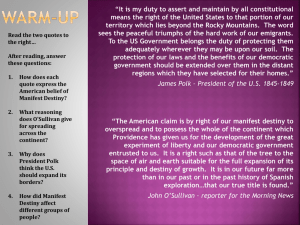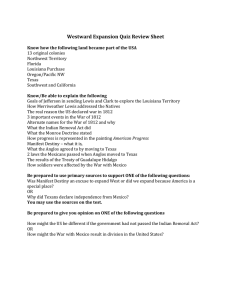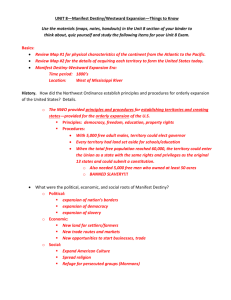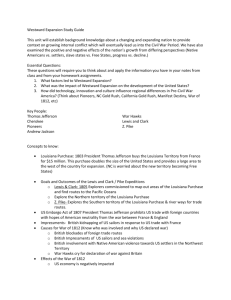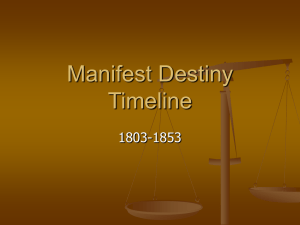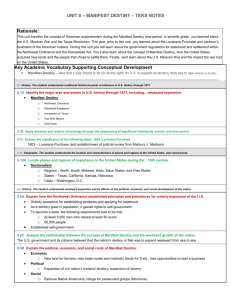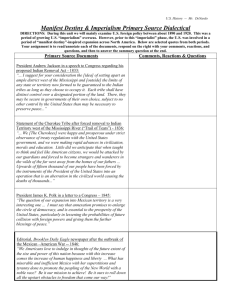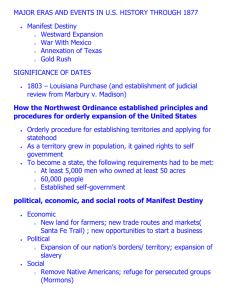(ie Syrian crisis of 2012) Unit 3 Notes: Westward Expansion Part 1
advertisement
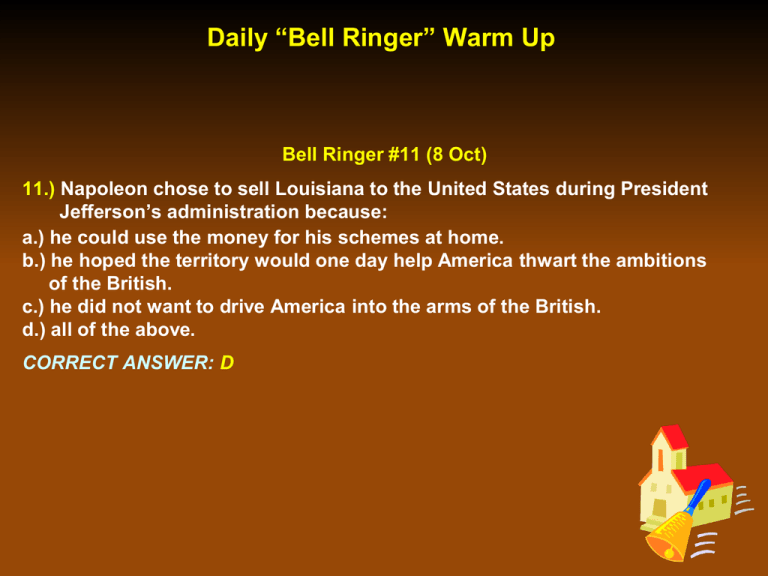
Daily “Bell Ringer” Warm Up Bell Ringer #11 (8 Oct) 11.) Napoleon chose to sell Louisiana to the United States during President Jefferson’s administration because: a.) he could use the money for his schemes at home. b.) he hoped the territory would one day help America thwart the ambitions of the British. c.) he did not want to drive America into the arms of the British. d.) all of the above. CORRECT ANSWER: D Philosophi-ball Part 1 Philosophi-ball Discussion Philosophi-ball Topic: - A government has a right to use force, including the forced removal of a group of people & killings of civilians, to achieve their goal or rid their country of perceived threats to their economic, social, & political structure. (i.e. Syrian crisis of 2012) Unit 3 Notes: Westward Expansion Part 1 U.S. History & The Constitution Mr. Weathers Today’s Lesson Standard / Indicator Standard USHC - 2: The student will demonstrate an understanding of how economic developments and the westward movement impacted regional differences and democracy in the early nineteenth century. USHC – 2.1: Summarize the impact of the westward movement on nationalism and democracy, including the expansion of the franchise, the displacement of Native Americans from the southeast and conflicts over states’ rights and federal power during the era of Jacksonian democracy as the result of major land acquisitions such as the Louisiana Purchase, the Oregon Treaty, and the Mexican Cession. "The Trail of Tears" by Robert Lindneux Chapter 6.3: United States Expands West (pgs. 199-201) 1.) Define the concept of nationalism that is emerging during the early 1800s? (use glossary to define) - A deep devotion to the interests & culture of one’s nation. 2.) What is the concept of manifest destiny that rises from this nationalistic spirit of Americans at this time? (use glossary to define) - The 19th-century belief that the United States would had a divine mission to inevitably expand westward to the Pacific Ocean & into Mexican territory. “American Progress” By John Gast (1872) Chapter 6.3: United States Expands West (pgs. 199-201) 3.) Why was Jefferson interested in obtaining the Louisiana Territory from France? - He feared that strong French presence in the middle of continent would threaten U.S. security and force the nation into an alliance with Britain. 4.) How did the Louisiana Purchase affect the United States & its government? - Doubled the size of U.S. territory; expanded the power of the presidency & the central government 5.) Who were Meriwether Lewis & William Clark? What was their significance? - Explorers & Co-Captains recruited by Jefferson to lead the Corps of Discovery Expedition into the uncharted lands of the Louisiana Purchase. See the primary source reading & questions on the worksheet for the answers to #6-8. 6.3 Jefferson Alters the Nation’s Course 1803 Louisiana Purchase (Territory) - Purchased from France $15 million = doubled size of the U.S. - Jefferson’s loose interpretation of the Constitution’s elastic clause set the precedent for future land acquisitions. - Secured Mississippi River as a highway for U.S. farm products. - Provided additional gov’t land for sale (Land Ordinance). - New land spread democracy = new states created on equal terms as the original 13. Louisiana Purchase 6.4 The War of 1812 The War of 1812 Causes 1.) Seizure of American ships by Britain. Key Events 1.) Admiral Perry defeats the British on Lake Erie. 2.) British eventually exert their naval superiority & blockade the Atlantic Coast. 3.) British seize Washington 3.) Revelations that Britain D.C. & burn the White supplied Native Americans House. with weapons. 4.) Andrew Jackson leads U.S. forces to victory in Battle of New Orleans. 2.) Impressment of Americans sailors by Britain. 5.) Treaty of Ghent ends the war. Aftermath 1.) The U.S. & Great Britain eventually resume trade with each other. 2.) Rush-Bagot agreement limits the number of warships on the Great Lakes. 3.) Both nations agree on northern boundary of the Louisiana Territory & agree to 10-year joint occupation of the Oregon Territory. Chapter 6.4: The War of 1812 (pgs. 202-205) 10.) What, if anything, did the War of 1812 accomplish? Support your ideas. - Solidified our standing as an independent nation, built a greater sense of nationalistic pride; spurred the westward movement on. 11.) How does the war of 1812 shape the concept of nationalism that was discussed at the start of this worksheet? - We proved ourselves for a second time, as a legitimate nation that could stand up to opposing world powers. We had a renewed sense of pride that we were truly united as one nation. Oregon Oregon Territory - U.S. claim to Oregon = based on the Lewis & Clark expedition. - Americans moved to Oregon in order to farm & trade in furs. - British & U.S. had joint occupation rights from 1818 until a treaty was signed (1840s). - “54’ 40º or Fight!” 1844 Democrat Pres. James K. Polk’s slogan. - Treaty of Oregon (1846) = Set Canada/U.S. border at 49º N Latitude. Early 1800s Political Scene Politics - 1820s & 1830: states dropped property qualification for voting & expanded the vote to all white males. - Disenfranchised Af. American property owners. - Andrew Jackson (Dem) = 1st president elected from the West - “Champion of the common man.” - Westward expansion strengthened the Democratic Party. Philosophi-ball Part 2 Philosophi-ball Discussion Philosophi-ball Topic: - A government has a right to use the concepts of manifest destiny & nationalism to expand its borders, including the forced removal of a group of people & killings of civilians, to achieve their goal or rid their country of perceived threats to their economic, social, & political structure. Indian Removal Act Indian Removal Act - U.S. westward movement displaced Native Americans. - Pres. Jackson’s Indian Removal Act (1830) = removed natives to the west = made room for whites. - S.E. Indians resisted (Seminoles = Florida) & Cherokee (Georgia) were assimilated. - Neither method successful. - Seminoles = defeated; Cherokee = lost legal land rights. - S.E. Indians = forced move to the Indian Territory in Oklahoma (“Trail of Tears” 1838-39). - Removed by Pres. Martin Van Buren. - Moved 800 miles west on foot. - ¼ of the population died (4000+ out of 15000). The Trail of Tears, by Robert Lindneux (1942) Indian Removal / Trail of Tears Impact on African American Slaves - Not all slaves trekked west with the owners = left family behind. - Westward expansion increased regional tensions. - Southerners defended their ‘peculiar institution’ & pushed slavery’s expansion = Civil War. Unit 3 Part 1: Westward Expansion Part 1 “I Am” Poem is a poem about a person, a group of people, or even an inanimate object which uses the ideas of emotions and senses. I am __________________________ I am I wonder I hear I see I am I pretend I feel I touch I worry I cry I am I understand I say I dream I try I hope I am “I Am” Poem Topics - A Federalist - A Democratic Republican - A pioneer moving west (man, woman, etc.) - A displaced Indian (Cherokee, Seminole, etc.) on the “Trail of Tears”. - An American soldier escorting the Indians to the Indian Territory (Oklahoma). - A slave displaced from his family. Today’s Lesson Standard / Indicator Standard USHC - 2: The student will demonstrate an understanding of how economic developments and the westward movement impacted regional differences and democracy in the early nineteenth century. USHC – 2.2: Explain how the Monroe Doctrine & the concept of Manifest Destiny affected the United States’ relationships with foreign powers, including the role of the United States in the Texan Revolution & the Mexican War. Role of the Federal Government & the Courts Supreme Court: - Marshall Court (1801-1835) strengthened role of the federal gov’t. - McCullough v Maryland (1819) - Court ruled Maryland could not stop the Bank of the U.S.’s operations by imposing a tax. (penalty taxes = unconstitutional - Upheld federal gov’t’s right to establish a national bank. - Gibbons v. Ogden (1824) - Court ruled only the federal gov’t could control interstate commerce. Role of the Pres. Jackson & the Federal Government Nullification Crisis (1830s) - Economic differences & North vs. South tensions over slavery’s spread west to the territories led to a conflict. - Fight between states’ rights & federal power. - North = wanted a high tariff to protect industries from foreign competition. - South = cash crops & consumers of manufactured goods; wanted those goods to be available at a cheaper price. - Viewed a high tariff as an “abomination.” - West sided with the North = support for internal improvements & cheaper land. Role of the Pres. Jackson & the Federal Gov’t Cont. Nullification Crisis (1830s) Cont. - 1830s: S.C. used the states’ rights argument to declare the tariff null & void. - Pres. Andrew Jackson was determined to uphold the federal gov’t’s right to collect the tariff in SC & - Threatened to occupy S.C. with troops to enforce the tariff. - Compromise tariff was created & threat of federal force = S.C. rescinded their nullification of the tariff, but not to reject the right to nullify an act of Congress. - The immediate threat to the Union was averted, for now… US President Andrew Jackson VS. SC Politician John C. Calhoun Monroe Doctrine Monroe Doctrine: - Early 19th century: S. American revolutions ended Spanish colonial rule & mercantilist relationship with Spain. - Britain then made strong trade ties with Latin America. - End of Napoleonic wars = European monarchs wanted to re-establish colonies in Latin/South America. - Britain encouraged the U.S. to join in opposing any new colonial claims. - President Monroe warned European nations not to attempt to reestablish those colonial claims. - American military was weak = British navy helped enforce the Doctrine. Manifest Destiny “Manifest Destiny” - ethnocentric confidence that other peoples were less favored by divine providence & should give way before the Americans. “Manifest Destiny” by Ken Salazar Texas Annexation & the Mexican War Texas Annexation - Americans moved to Texas at the invitation of Mexico to have more land for cotton & slavery. - Terms included that Texans would obey the laws of Mexico. - Texas revolted & won their independence after Mexico outlawed slavery. - Mexico did not recognize Texan independence. - U.S. delayed Texas’ annexation to avoid controversy that the addition of a new slave state. - Texas was independent for almost 10 years. Final Battle of the Alamo: March 6, 1836 Texas Annexation & the Mexican War Mexican War (1846-48) - Manifest Destiny - rallying cry for James K. Polk’s election in 1844. - Texas was annexed by Congress shortly thereafter (1845). - Pres. Polk sent emissaries to purchase additional Mexican territory = offer was rejected. - Polk sent troops to a region in dispute between Texas & Mexico. - Interpreted by Mexico as a hostile act = shots fired. - Pres. Polk interpreted the action as an act of war. Siege of Veracruz, Mexico (March 1847) Major General Winfield Scott & U.S. Troops March into Mexico City September 1847 Texas Annexation & the Mexican War Mexican War & the Mexican Cession - U.S. forces pushed into Mexican territory. - Peace treaty = U.S. got land that includes modern states of California, Arizona, & New Mexico (present southwestern U.S.). - Established an adversarial relationship carried into the 20th century. Mexican-American War Political Cartoon – “Plucked” Cartoons for Test Questions 30- 34
